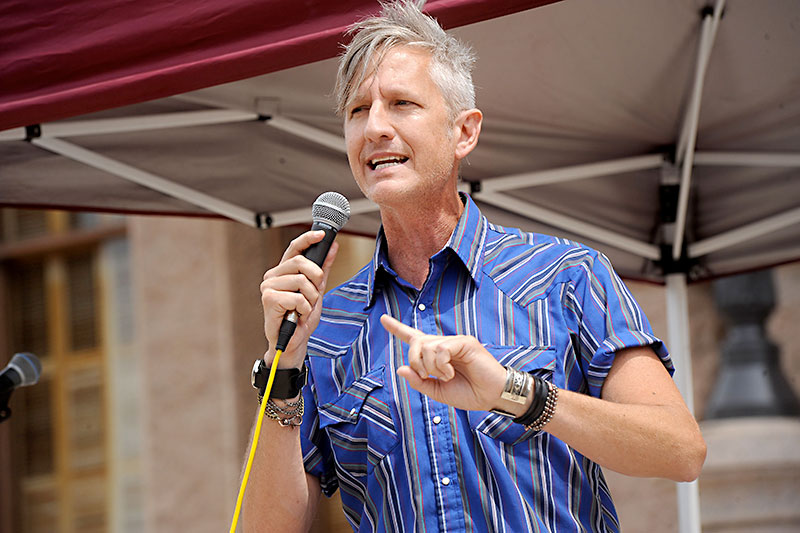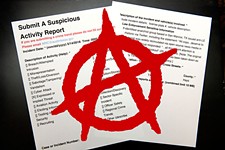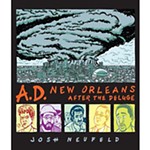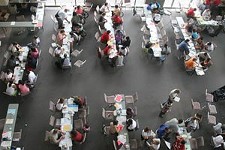Q&A With Scott Crow
Anarchist and community organizer co-founded Common Ground Collective
By Waylon Cunningham, Fri., Aug. 28, 2015
In the chaos of Katrina's early aftermath, when relief was still disparate and unorganized, Scott Crow traveled from Austin to New Orleans to look for his missing friend. Robert Hillary King, a former Black Panther released from solitary confinement only a few years earlier, was found alive and well on his front porch, and soon afterward, Crow, along with Sharon Johnson and Malik Rahim, founded the Common Ground Collective with the goal to deliver basic aid to poor and predominantly black neighborhoods that were being neglected by federal response. Crow, a lifelong anarchist who prefers his name spelled with no capitalization, drafted the early organization along principles of autonomy, self-sufficiency, and local control. This model of left-politicized aid relief has since been used in other American disasters, from Occupy Sandy in the Northeast to #OpOK following Oklahoma's 2013 tornado disasters.
Austin Chronicle: Have you been to New Orleans since Katrina?
Scott Crow: I stopped going regularly in 2008, but I went for the 9th anniversary for Common Ground last year. It's a mixed city. Definitely whiter, younger, smaller, and in the core of it, wealthier. But there's also still huge amounts of disaster, like in the Lower Ninth Ward where there are wide empty spaces of land. People who just didn't come back. And then also along the Gulf Coast, there are these forgotten communities like the Creole, the Cajun, the Vietnamese fishing villages, the First Nation communities – they're still largely forgotten about and never rebuilt the same way.
But there are pockets in those that are amazing. Common Ground Relief is headquartered in the Lower Ninth, and they've built blocks and blocks of neighborhoods there. And some people in those areas are doing better now than they were before, when they were being killed by the slow disaster of capitalism.
AC: That reminds me of a recent New York Times article, which reported that there's a racial gap for recovery. Four out of five white residents believe the city has fully recovered, while three out of five black residents say the opposite.
SC: Think about this. They tore down 5,000 units of housing of public housing. They've only built a minuscule fraction to replace those. And even if they rebuilt them now, this is 10 years later. And New Orleans is an intergenerational city, one of the few places in the country. People have lived there for 200 to 300 years. Houses were handed down, from mom to kid, and they weren't passing around paperwork. Lots of poor housing was just there. But that housing is gone: taken away, destroyed, or the diaspora happened so people were living in Idaho or Texas or Missouri. That housing is gone. What replaced it? Rents went from, pre-Katrina, $200 to $300 for a shotgun house in many neighborhoods, to $1,200 to $1,500. All while the average wage remains at $6 or $7 dollars an hour. That's the kind of stuff that's never gonna bounce back.
AC: So the Common Ground Collective has become Common Ground Relief. Does it still operate on anarchist principles?
SC: The Common Ground still exists today, but it's a totally different organization than it was in 2005 to 2008. That revolutionary potential is gone but that doesn't mean it's a terrible organization. It's just a professional nonprofit that does really good work.
And it's still a legacy of those revolutionary days. All these projects that spun out of it: the clinic, the women's center, the community gardens, the land projects and wetlands restoration. These are projects that still exist for those communities from what happened. Is it enough? No. Is it ever gonna be enough? No. Because you have 500 years of devastation on these communities. We did what we could. We opened that crack in history, as the Zapatistas say. We did what we could to help those communities rebuild themselves in their own way or to build new infrastructure that have never existed.
AC: Is there anything that you wish you or Common Ground had done differently in those days?
SC: I wish we had listened to ourselves more. Because the people who started Common Ground, not just the founders, were all longtime political organizers. But we sometimes deferred to people who claimed authentic leadership of New Orleans who turned out not to be, well, not authentic leadership.
And I wish we had been more forceful in some ways. I don't mean to say more guns, like what happened in the very beginning, but I wish we had been less timid. This was an unmapped set of ideas when we built the collective.
AC: What do you mean by "forceful"?
SC: I wish we had taken abandoned land and just built community gardens on them instead of waiting for permission. We didn't always wait for permission. There were many times we broke the law. And this is a small regret, I don't want to magnify it.
Really I could wish we could have built the organization before the storm, before the disaster so the communities were already prepared. That's what happened with Occupy Sandy. A lot of people from Common Ground were a part of that. They were much more prepared than we were. They already had stuff on the ground. The networks, the organizational structures.
In May 2013, when two F5 [tornadoes] touched down in Oklahoma, people were able to step in from Occupy Sandy and Common Ground. I didn't realize that autonomous, anarchist-inspired, decentralized disaster relief and rebuilding was gonna become another pathway for people to take control of their own lives.
AC: It sounds like the opposite of Naomi Klein's Shock Doctrine. Disasters become an opportunity for community building, rather than exploitation by markets. Do you think this bottom-up model of politicized aid relief is the biggest legacy from Common Ground?
SC: I think the ideological shift is definitely one of the bigger ones, but I'm interested in the very small projects that came out of it: the clinics, the women's shelter, these First Nation communities with new tools for autonomy.
FEMA came to Occupy Sandy and grilled them about it: how they were doing it; how did they engage; why is it different. They asked because Occupy Sandy was able to put a human face on disaster relief, while these bureaucratic governments couldn't. FEMA did a big report about it. Occupy Sandy and the Common Ground Collective and how these kind of things have risen up. They're looking at the models also, and that's not really what I want. I don't want governments to adopt these models. I want people to adopt the models because there's power in us doing it ourselves versus waiting on the government to be kinder and gentler. Governments, when they come in after disasters, they're always going to try to restore law and order first. Ours is to get people back on their feet and to build their community back the way they want to, not the way that they have to because the disaster relief people are there.
AC: Right. Is there anything you think that FEMA could have done differently to be an ideal government intervention?
SC: The only thing that FEMA could have done is abolish itself. You can't reform it. Those billions of dollars thrown at them or the Red Cross could be spent on thousands and thousands of groups across the United States that do the work autonomously, decentralized, and locally. FEMA will never be able to do that. They just can't.
AC: Do you still keep up with the old members of the collective? The other founders, Sharon Johnson and Malik Rahim?
SC: Malik and I often do interviews together. There's an interview we did with RT News that was really good – about picking up arms against the white militias and police. He's still in New Orleans and hasn't stopped organizing. He's doing grassroots work there with ex-offenders and working with the Angola 3 support committee. Sharon works at the Common Ground Clinic, which is a separate entity from Common Ground Relief. I talked to her last year for the first time in seven or eight years.
AC: What about Robert H. King, the former Black Panther? At the beginning of your memoirs on the Common Ground, he seemed to be the main impetus for going to Katrina's disaster zone – to make sure he was safe.
SC: He's doing great. He lives right down the street from me, about 10 houses down. He travels about 200 days a year. He speaks all over the world. He meets with governments. He talks about issues of solitary confinement, the Black Panther Party, political prisoners in the United States. He's been working with Amnesty International for the past five years on the issue of solitary confinement, and he's working to free the last incarcerated member of the Angola 3, Albert Woodfox, who is now the longest held person in solitary confinement ever. I think at 44 years now. but he may be walking free next week. He's going to Albert's hearing on Tuesday.
Got something to say on the subject? Send a letter to the editor.













